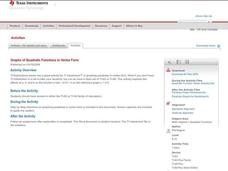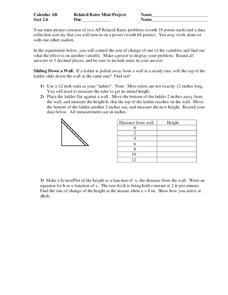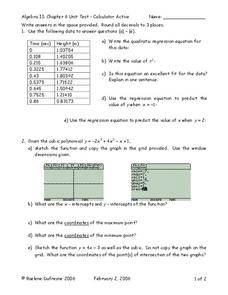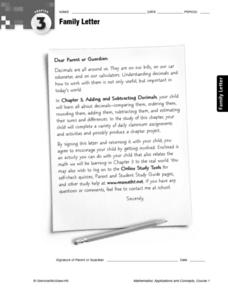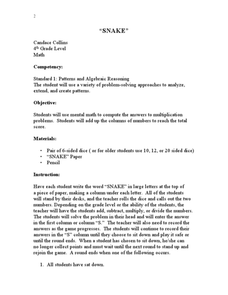Sea World
Seals, Sea Lions, and Walruses
Learn about the mammals of the sea with a lesson about seals, sea lions, and walruses. Kids study the characteristics of each pinniped with flash cards and information, and then analyze data about elephant seals, measure heat loss...
Curated OER
Graphing Quadratic Functions
Pupils explore quadratic functions in this algebra instructional activity. They investigate transformation of quadratic functions using the TI calculator. They use the vertex form for this instructional activity.
Curated OER
Transformations of Functions 2
Solving problems on the TI graphing calculator can be quite easy. Students observe the properties of transformation of functions and create a formula for the transformation.
Curated OER
Exponential vs. Power
Pupils differentiate between exponential and power functions. They identify the base, exponent and properties of exponential functions. They also graph the functions using the TI calculator.
101 Questions
Thanksgiving Taters
What would a meal be without the taters? The question is, how long does it take to peel those potatoes? Given the rate of peeling one potato, scholars predict the time it takes to peel the bag. The twist is that the first potato was...
Curated OER
Recognizing and Extending Number Sequences
Kids work to recognize and extend number sequences. They determine the rule in order to find the missing number in each sequence given. They review the concept, practice finishing sequences with a calculator, and explain each rule.
Houston Area Calculus Teachers
Related Rates
Use a hands-on approach to exploring the concepts of related rates in your AP Calculus class. Individuals explore the effect of the rate of change on a variable related to a variable they control. After analyzing the data they...
Mathematics Assessment Project
Discovering the Pythagorean Theorem
Young mathematicians join the ancient order of the Pythagoreans by completing an assessment task that asks them to find the area of tilted squares on dot paper. They then look at patterns in the squares to develop the...
Curated OER
Euler's Method Introduction
Young mathematicians define and use Euler's method to solve problems in this calculus lesson. Learners visualize graphs and solve differential equations. They create these visuals on the TI calculator.
Curated OER
Decimals, Percent and Scientific Notation
In this decimals, percent and scientific notation worksheet, 9th graders solve various types of problems that range from shading an indicated part of a shape to calculating using scientific notation to express their answer. They express...
Curated OER
Area and Perimeter Activities
Read this article before you begin teaching geometry! It gives teachers some insight into the world of teaching geometry to young learners, and four area and perimeter lessons are attached.
Curated OER
Discovering Pi/Welcome to Pi Day
Learners explore pi. In this circle measurement lesson, students define and identify radius, diameter, circumference, and perimeter. Learners work in groups to measure several plastic lids and record their findings. Students compare the...
Curated OER
Calculator Game: Multiples of 5
In this multiples learning exercise, students use a calculator to calculate multiples of 5. Students use the number chart to complete the multiples game.
Curated OER
Calculating Elapsed Time
Students calculate elapsed time in a series of activities. In this calculating time lesson, students view a Cyberchase video that demonstrates how to calculate elapsed time. Activities include counting, subtracting and regrouping in base...
Curated OER
Interest Calculation and Spreadsheets
Students, while in the computer lab working on a spreadsheet program, calculate interest and accumulated value of a savings plan. They follow specific directives on how to create their spreadsheets. At the end of the lesson they print...
Curated OER
Mystery Operations: Math, Patterns, Logic
In this activity the computer/teacher makes up a mystery operation, and you have to figure out what the operation is. You give the computer/teacher two numbers to calculate, and it tells you the answer. This is your first piece of...
Curated OER
Cryptography on the TI-83 Graphing Calculator
Students explore the history of cryptography. They assess function notation and transformation, matrix operations, and the fundamentals of modular arithmetic. Using graphing calculators, students develop their own encryption schemes.
Curated OER
Polynomial Functions
In this Algebra II activity, 11th graders use a graphing calculator to determine the regression equation of the given data, graph polynomial functions, factor polynomials, and determine the quotient and remainder in polynomial division....
Curated OER
Calculator Count to 1000
Students develop an understanding that large numbers are made up of smaller ones. They develop multiples by skip counting with a calculator to 1000. They share their lists and patterns.
Curated OER
Calculating The Poverty Line
Students examine the poverty line. In this poverty line lesson, students discover what the poverty line is and how the U.S. government determines it. Students calculate alternative poverty lines and examine their implications.
Curated OER
Area Calculations
In this area activity, students calculate the area of figures and determine the length of x. A reference web site is given for additional activities.
Curated OER
Family Activity: Adding and Subtracting Decimals
In this math worksheet, learners work at home with a family member to add and subtract decimals in a sample check register. Students add deposits, subtract withdrawals and determine the balance of the account.
Curated OER
Calculating Perimeter Using Grid Method
In this perimeter worksheet, students use sets of grids to calculate the perimeter of shaded areas in units. A reference web site is given for additional activities.
Curated OER
Math Activity: "Snake"
Fourth graders explore patterns by participating in a class math activity. In this early algebra lesson, 4th graders utilize a die and chart to keep record of a snake game in which students must utilize a math function to solve a problem...

